Hey there!
Trying to decide between Amplitude or Mixpanel?
IT’S A NIGHTMARE!
Don’t worry, it’s actually way easier than you think. Both tools are great (way better than Google Analytics!), but they’re slightly different and for slightly different customers.
In this review, I’ll explain exactly who each one is for, point out the key differences that affect every purchasing decision, and give you definitive guidelines for choosing the right one for your team.
Not only have I used both of these tools for myself and clients, I’ve compiled opinions from across the online marketing space for the last month to make the review more comprehensive.
So, close all other Amplitude vs Mixpanel reviews (pretty please…), and get ready to get the definitive answer to mankind’s most puzzling riddle.
Ready? Let’s go!
In a Rush? Find Out Which Tool Is Right for You
Who Amplitude is For
Enterprise-scale business wanting best-in-class user analytics for building customer personas, measuring feature impact, reviewing their user journey, and funnel analysis for growth-hacking.
Pro
- Unrivaled reporting and visualization: Amplitude goes deeper than any other tool with unique user behavior, user growth, predictive analysis, and feature impact analytics. It just does what no other tool can.
Con
- You need tons of data: Amplitude’s high-end reporting is practically useless without heaps of data (25,000+ users per month).
Who Mixpanel is For
Mobile app and cross-platform companies looking for the right combination of user analytics, marketing, and CRM.
Pro
- More than analytics: Marketing suite, basic CRM, and easy integrations with Hubspot, SalesForce, and Zapier – Mixpanel not only gives you actionable info, it lets you TAKE action on that data.
Con
- Lacking high-end advanced reporting: Mixpanel doesn’t give you all the cool advanced reports like Amplitude does. That being said, MOST companies don’t even need them.
Amplitude vs Mixpanel: What’s the Difference?
If I had to sum up the key difference between Mixpanel and Amplitude, it would be:
Mixpanel has a wider focus while Amplitude is focused solely on being the best analytics software on the market.
Mixpanel is like a fine charcuterie board – a delicate mix of high-end features like analytics, reporting, marketing, notifications, and CRM.
Amplitude on the other hand wants to be a best-in-class analytics software with better reporting, features, customization options, and visualization tools.
Quick Verdict: Choosing Between Mixpanel and Amplitude

Whenever people ask me “Hey, Karl. Should I get Mixpanel or Amplitude”, it always comes down to a few easy-to-answer questions.
Remember, there is no “better” tool. There’s only a better tool for you.
Do any of these scream you?
1. Choose Amplitude if you have enterprise-level marketing/users
If you’re doing enterprise marketing and have tens of thousands of users, you’ll benefit exponentially from Amplitude’s powerful data analysis. You’ll get granular insights into your user base, funnels, and user journey.
Imagine being able to immediately see how a new feature impacts signups or purchases at an enterprise scale or how large user personas interact with your onboarding funnel. You won’t get that type of value with other analytics tools.
2. Choose Mixpanel if you want to send notifications
The #1 feature of Mixpanel is the ability to TAKE ACTION directly within the tool by sending targeted text, email, push, or in-app messages.
That way, you can see what’s working and double down on it. Or, you can see which behaviors are most likely to result in a purchase (or any positive outcome) and steer users toward it with a well-timed message.
With Amplitude, you’d need an integration (and another subscription fee).
3. Choose Amplitude if you want to go as far as possible for free
Amplitude offers all its core data analysis and reporting features, unlimited data retention, and 10 million actions per month FREE. So, if you’re a startup or small business with a few thousand users or less, you’ll get very far.
Say you have a small app with 2,000 users, that’s 5,000 events per user on average, which is plenty of event data to get some decent insight into funnels, group behaviors, and retention. I know people running small businesses on Amplitude totally free. It’s a steal.
Mixpanel vs. Amplitude: Overview
What is Amplitude?

Amplitude is the world’s most advanced product analytics tool. It fills the black hole between product and outcomes, giving you unrivaled insight into how users behave within your product.
It takes every user interaction and visualizes them in the form of actionable data ranging from persona behavior, user retention, event path analysis, user base growth, and more.
You can then take that data and use it for anything from optimizing conversions, predicting customer behavior, customizing experiences, and increasing lifetime value (LTV).
Ultimately, Amplitude is designed to improve decision making, innovation, product performance, and LTV.
Most other analytics tools try for a more all-in-one approach. Amplitude is one of the few that has stuck to the basics. This is an analytics only platform you get when you’re ready to dig deep into data all day every day.
What is Mixpanel?
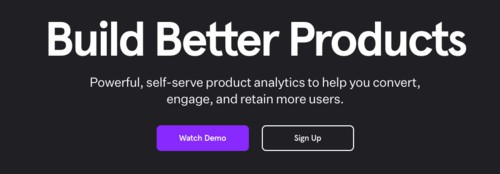
Mixpanel is a self-serve, do-most-of-it-all analytics platform designed to help you analyze data, and engage, convert, and retain more users. Hard to argue with a tool used by Uber, Google, Zip Recruiter, GoDaddy, and Twitter. It originally focused more on mobile apps, but has since grown to be more product focused.
Unlike Amplitude, Mixpanel is more like an all-in-one platform that directly plugs into your marketing department and does a little bit of everything.
What it lacks in depth it makes up for in convenience and usability. Push notifications, team communication, integration with major marketing platforms, user webhooks – Mixpanel gives you granular data AND empowers you to take action.
What Are the Key Differences?
Core Reporting (Retention, Segmentation, Funnels)
When it comes to core reporting, Mixpanel and Amplitude are like Siamese twins where one is vanilla and the other is an eclectic painter who hides in his studio painting all night.
They both take an event focused approach, so you’ll get the same core reports from both, just in totally different ways.
I define core reports as:
- Segmentation: Both tools take a segmentation first approach. That is, grouping users together based on common user properties. This could be location, age, paid vs. unpaid, etc.
- Funnels: How users convert from one event to another. This helps to answer questions about your marketing funnel like “at which step in the funnel do users drop off the most” or “what percent of US customers signed up for my service in the last 7 days”. The result? More efficient lead generation.
- Retention: An assessment of user engagement over a specific period of time. If you want to see things like how many users are still on board two weeks after signing up, this is how you do it.
Both allow you to visualize the data as bars, trends, tables, and other various graphs.
Here’s the key difference:
Mixpanel Core Reports
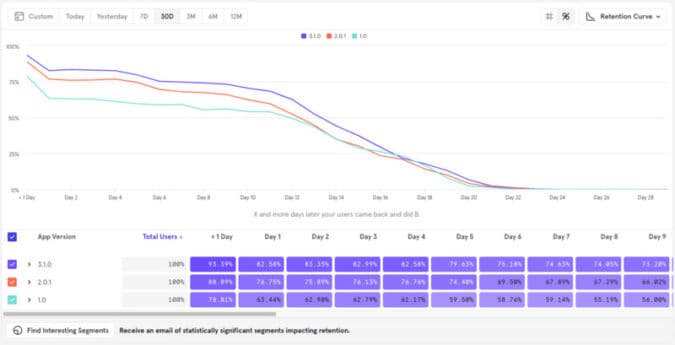
Mixpanel delivers core reports in a very simple, easy-to-digest way. Even though there's more data, the data is in much more digestible chunks
You get the basic dash first, then choose customizations after. It’s really easy to get the hang of. It shouldn’t take you more than 10 minutes of poking your nose around.
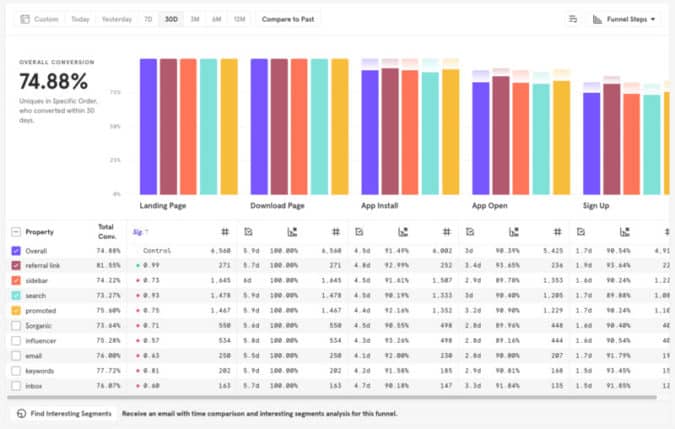
There’s a ton of digestible and actionable information here. Personally, I get a bit of analysis paralysis when dealing with big data, so it’s nice to have Mixpanel make the decision for me.
THIS IS WHERE YOU START, AND THAT’S FINAL.
Amplitude Core Reports
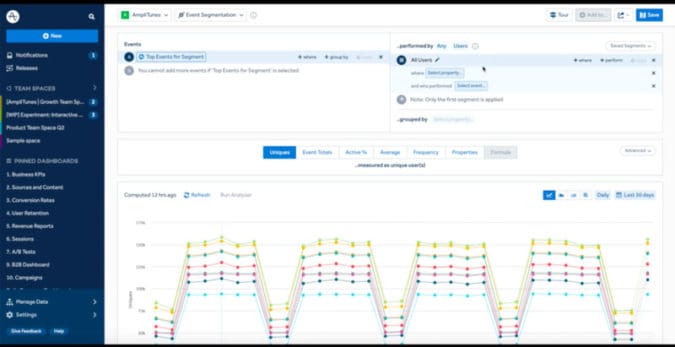
Amplitude takes the reverse approach. They want you to choose customizations first before getting started, which can be a bit overwhelming.
After that, it’s fairly smooth sailing.
My favorite feature in segmenting reporting is Formulas. You can quickly find the average of a certain event, the total, unique users, rolling averages, and a ton of other cool things. Again, not really valuable unless you have the data to use it.
Advanced Reporting
This is where Amplitude has a clear edge. Amplitude prides itself on being the geekiest analytics software out there, giving you the most data to measure success. It’s clearly the better solution for large companies needing detailed information and analysis of vast swaths of data.
They both share a few common advanced reports like:
- Flows/Pathfinder
- Signals/Compass
- Cohorts
Now here’s where Amplitude starts getting some separation. The game has been tight so far, but Amplitude is just too big, too strong, too fast for Mixpanel to hold up.
Here are a few advanced reports you’ll get that you can’t get with Mixpanel:
Personas
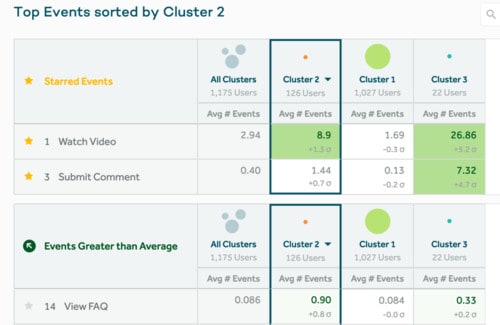
Personas groups your users into different clusters based on similarities in behavior. It’s a great way to find similarities between user cohorts that you might not have thought to look for.
Basically, you can use this data to create comprehensive user personas to drive greater customer retention and engagement.
Amplitude generates an event chart that groups users into different patterns of behavior. The biggest advantage in my opinion is identifying power users.
Say you have an app and want to find out what drives new users to come back and use the app again. All you’d do is select “new users” in Personas, set your time frame, and analyze the chart to see which actions returning users performed the most.
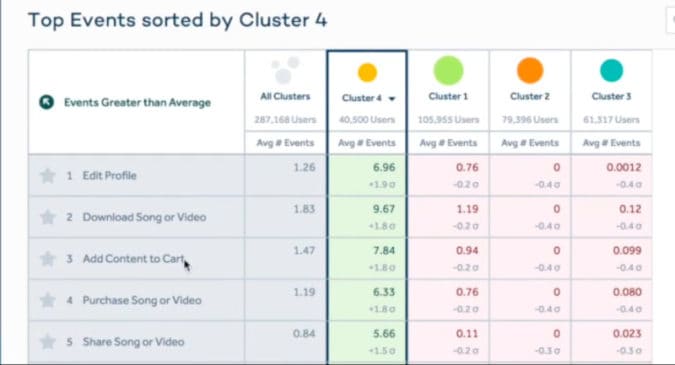
In this case, users who edited their profile or downloaded a song were more likely to engage with the app. See the value in this for your product team? Now you know to push users to edit their profile, download a song or video, or share with their friends.
Lifecycle
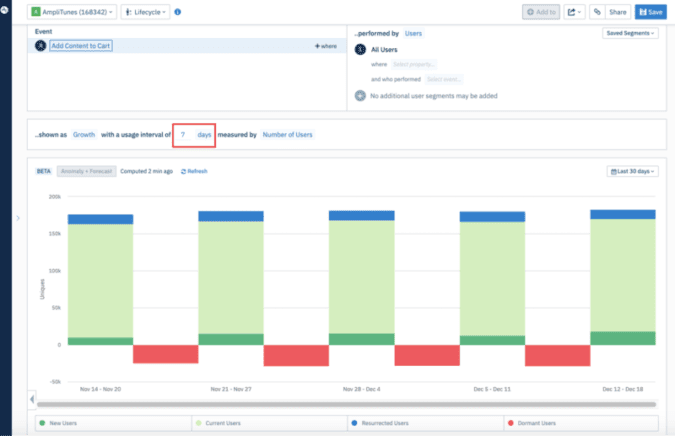
Lifecycle is a 10,000-foot view of how users interact with your product’s “critical event”. If you’re a dating app, that could be getting your first match. If you’re a food delivery app, it could be placing your first order.
From there, you can see current, dormant, or resurrected users.
This bird's eye view can help your team make decisions about keeping current users engaged or giving reasons for dormant users to return.
Impact
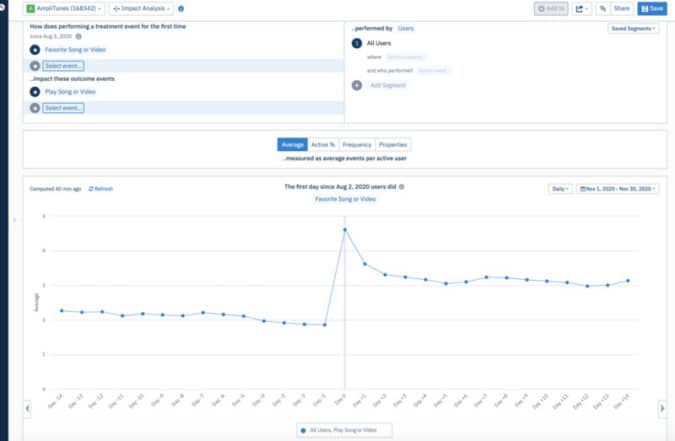
Now we’re getting GEEKY BABY. Impact shows how one feature affects the rate of another behavior.
For example, you can track how often a user plays a song after they discover the ability to “favorite” that song.
Basically, you use it to see how a new or newly changed feature affects user behavior. Pretty fun!
Note: Amplitude has recently released Journeys, an AI-powered tool that automatically points out the most important events in your user’s journey. The more you know about your user journeys, the more you can keep them engaged by hitting them with the right message, offer, or experience at the right time.
Pricing
Did you skip the entire article to see my thoughts on pricing?
Let me quickly sum it up for you here:
Mixpanel is much cheaper than Amplitude, especially if you have a small number of users (~10,000 or less). If you’re on a budget, Mixpanel is a no brainer choice. You’ll save tens of thousands per year.
It’s less than $200/mo for 10,000 users.
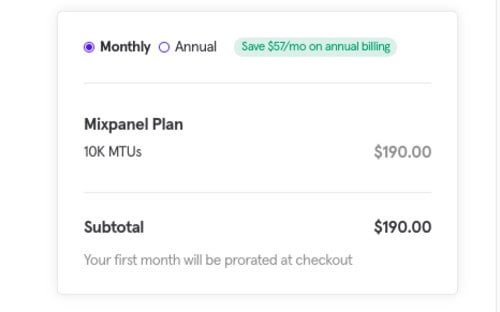
They both have a lot in common here. Both Mixpanel and Amplitude have enterprise plans and multiple pricing tiers, but here’s how they differ:
Amplitude
Amplitude reminds me of those high-end restaurants on every main square in Europe who don’t put the price on the menu. Trust me, if you have to go inside, it’s EXPENSIVE.
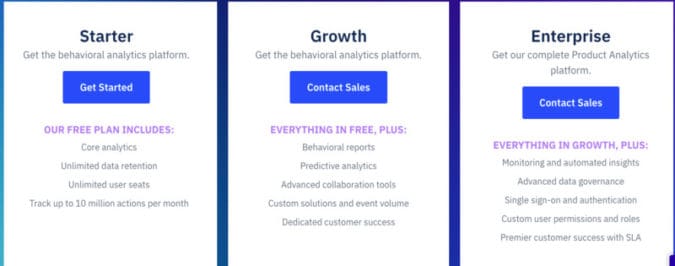
I hate having to contact sales. Why are you making it hard for me to throw money at you?
It’s understandable though.
They build you a custom plan based on your specific needs. After talking to a lot of people in the industry, I’ve heard everything from ~$15,000 per year to $100,000 per year for Enterprise.
Amplitude charges based on which features you want. So again, it’s only worth it if you need the super advanced features and have a ton of users/data to work with.
Note: I highly recommend taking an initial demo tour BEFORE diving into Amplitude. It’s pretty complex and tough to get the hang of. You’ll need to watch a tutorial video or two to figure out all of the advanced reporting, too.
Mixpanel
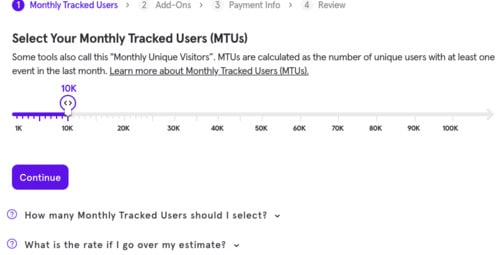
Mixpanel charges based on the number of individual users. So pretty much all features are available no matter how much you pay. You can get really solid value for about $1,500 per year.
Prices go as low as $36/mo for some very valuable data – can’t beat it.
Free Plan
Do you know how many people contact me asking which tool has a better free plan?
Not many…
They both use the freemium model, but there’s actually a striking difference in each plan, so let me cover in a bit more detail.
Amplitude
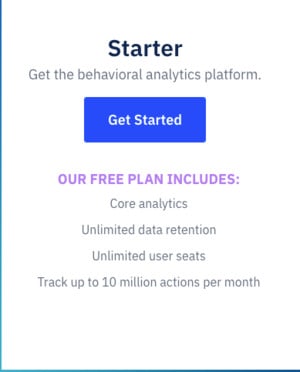
For $0/mo, you get core analytics (segments, funnels, retention) and unlimited user seats. And that’s up to 10 million user actions per month.
An action is basically any way a user interacts with your product. It could be clicking a link, signing up for a newsletter, clicking a new feature, or any other behavior that’s trackable. 10 million sounds like a lot, but it adds up quickly.
If you’re a new app/product with a low number of users, there’s no reason to pay for it yet.
Mixpanel
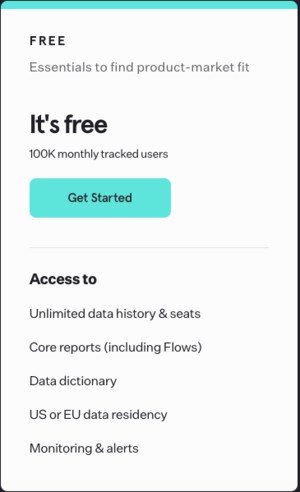
Mixpanel has stepped up its free plan hardcore recently to compete with Amplitude. Now you get 1,000 tracked events per user and up to 100,000 users.
The plan comes with:
- Insights
- Funnels
- Flows
- Retention
- Explore
- US and EU data residency
Plus data management, monitoring and alerts, unlimited data history (I love me some historical data), and integrations.
Not too shabby… however, I don’t recommend it over Amplitude. 1,000 events per user is nothing.
I think I’ve already fired off 1,000+ events while writing this article, and I’m not using any apps or products.
Note for Startups: Both Analytics tools offer a scholarship plan for qualifying companies. Amplitude’s is slightly more prohibitive though. For both tools, you need a new company (founded in the last 2 years) and received no more than $5 million in funding. Amplitude also stipulates that you have no more than 20 employees. For their scholarship, you get 1 year of Growth free. Mixpanel’s gives you $50,000 in credits to be used toward a Growth plan, which is more than enough to get by for a full year.
Miscellaneous: Dashboard, Usability, API documentation, etc.
Like I said before, these two Analytics tools are basically twins. Amplitude and Mixpanel do so much in common that people like you have to come to reviews written by people like me just to even figure out what the hell the difference is.
So before we wrap things up, I just want to touch on a few of the similarities in case you’re interested.
Dashboard
Both Amplitude and Mixpanel give you a nice, clean user interface with a bunch of key features like cohorts, bulk filters, and TV Mode. Plus the ability to build custom dashboards in just a few clicks.
Behold, Amplitude!
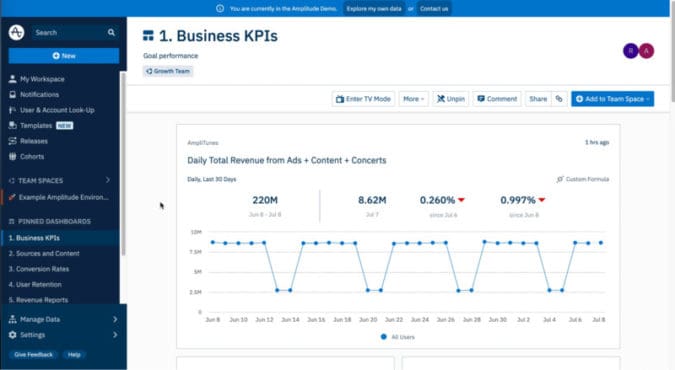
Mixpanel’s is slightly better in my opinion just because it’s a bit easier to navigate and a little easier on the eyes:
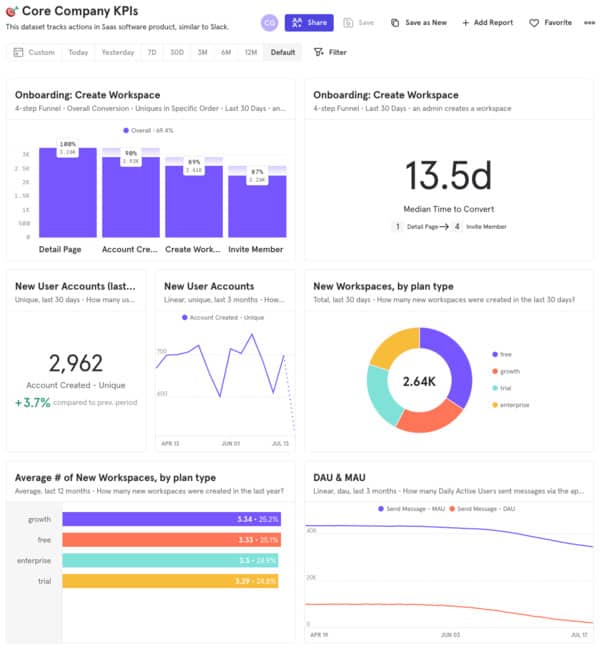
Mixpanel’s is largely self explanatory.
In terms of functionality, it’s a wash.
APIs
Both tools offer SDKs for Java, iOS, and Android, but Mixpanel also has backend SDKs for Ruby, Python, Node.js, and Unity.
Again, they’re both super similar, but maybe a slight edge to Mixpanel here just for the time savings when setting up your tracking.
Usability
So what’s it like to actually use each of these tools?
Frustrating. This stuff is hard.
OK, seriously, both tools are fairly similar, but Mixpanel has a shorter learning curve. Amplitude is all about customization. That’s great, but if you’re new to the game you might not even know what you need.
That’s why starting with the free version is a great idea even if you plan to purchase one of the paid plans. Get your feet wet and figure out how they actually work first before buying.
Data Governance
Managing the structure of user data within both tools is fairly similar. Amplitude uses Taxonomy:
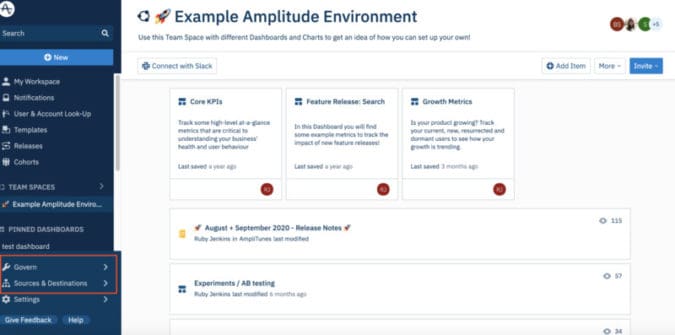
Mixpanel uses Lexicon:

These features empower modern businesses to organize all the data in their product for greater clarity and discoverability. Basically, they allow you to structure your data according to internal naming conventions for greater usability across teams.
Conclusion – Amplitude or Mixpanel?
It’s important to remember that neither of these tools is “better” than the other. There’s no winner or loser between Amplitude and Mixpanel.
It all depends on what you’re looking for, your budget, your user base, and how much you want to geek out.
If you’re looking for the absolute best analytics, you should absolutely choose Amplitude
If you’ve got 25,000+ users, tons of data, and want the best analytics available get Amplitude. It’s not even a debate.
If you have 1-10,000 users and just want affordable analytics, choose Mixpanel
Mixpanel is the better choice for businesses without the data and users to take advantage of Amplitude’s advanced reporting. If you’re just starting out and need solid analytics for a small user base, Mixpanel is for you.
If you’re looking for the best free tool and don’t have too many users, get Amplitude
Amplitude allows you to track up to 10 million events for free, which is plenty to get some real juicy insights into your user base. You’ll get a lot farther on their plan than Mixpanel’s.
F.A.Q
Q: How are Mixpanel and Amplitude different from Google Analytics?
A: Mixpanel and Amplitude are different from Google Analytics because Google Analytics is more focused on analyzing sources of traffic organic search. Amplitude and Mixpanel are concerned with how users behave once they reach your product whereas Google Analytics is focused on how users got to your website or app.
Q: What is the difference between Amplitude and Mixpanel?
A: The difference between Amplitude and Mixpanel is that the former has more advanced reporting whereas the latter is mostly a “do-it-all” analytics tool. They both use the same method of data collection, but one shows you more advanced data.
Q: Is Mixpanel better than Google Analytics?
A: It’s hard to say if Mixpanel is better than Google Analytics since they do different things. One is about analyzing user events, predictive analytics, analyzing analytical outcomes, and improving LTV. Whereas the main focus of Google Analytics is seeing how users got to your website or app. You really should be using both Google Analytics and Mixpanel.




